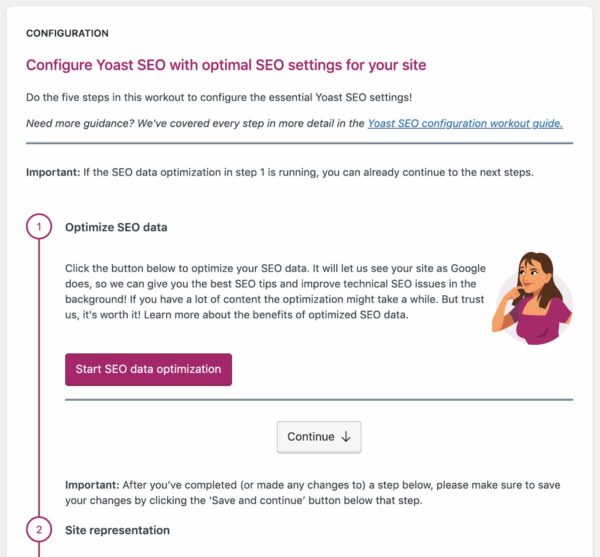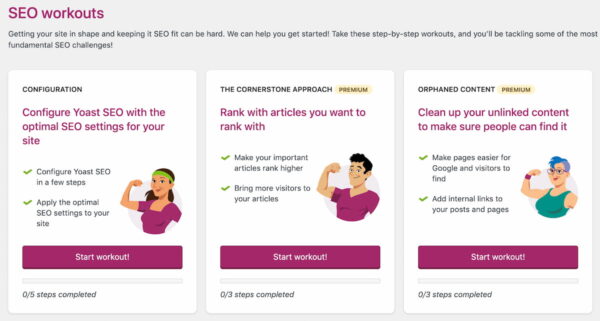When you started your business, what were the first steps you took to establish yourself in the market? You probably thought of a name and created a logo to go with it. Who knows, maybe you also created a few social accounts to introduce your business to potential customers right away. But like most businesses, both online and offline, you probably also created a website to reach your audience. Which is great. However, it’s also important to properly introduce your website to Google, even when your website has been live for a while. In this post, we’ll explain why and how you can do this using our new configuration workout!

Pro tip
Since Yoast SEO 17.7, we’ve replaced the configuration wizard with our new configuration workout. If you haven’t updated to the latest version of our plugin yet, make sure to do so and you’ll be able to do this workout right away! The configuration workout is available in both the free and Premium version of Yoast SEO.
Why introduce your site to Google?
There are many ways to promote your website and get your audience to visit you online. Investing in SEO and optimizing your pages for the search engines is also very much worth your while. Which you might already be aware of. But did you also know that you can enhance Google’s understanding of your website which helps them present your site even better? By providing Google with some basic, but vital information on your business you’ll have a higher chance of Google showing the right information to your users. It can also increase your chances of getting a knowledge panel about your business, the block you sometimes see on the right side of your search results.
However, providing Google with this information, and making sure that it’s correct, doesn’t happen automatically. You need to help Google to better its understanding of your website and business. By properly introducing yourself. Because if you don’t, Google might not understand what your website has to offer. Kind of like a shop without a name sign out front. And this makes it less attractive for Google to direct people to your website as they’re not quite sure what they will find there.
Structured data is the way forward
So how do you help Google get a better understanding of your website? By using structured data. Essentially, structured data is a way of describing your site and its content in a way that’s easy for search engines to understand. It changes your content into code that search engines can process right away. Search engines like Google read this code and use it to display your pages in a much better and richer way in the search results. And adding this piece of code to your website is not something that you need to do yourself. Yoast SEO automatically adds a lot of this structured data for you, helping Google get a better idea of what your pages are about. Want to know more about this? Join our free workshop Boost your organic visibility with structured data on the 7th of December.
Yoast SEO makes it easy for you to add structured data to your pages, by creating a structured data framework of your pages, allowing you to set different types of content and by offering structured data blocks. But it is important to start at the beginning and get your basic information right. That’s why we’ve created this new configuration workout. This workout allows you to provide this information and provide Google with the first piece of information it needs.
Get the most out of Yoast SEO with this workout
This new workout takes a few minutes, but it allows you to give some basic information about your website and business. This helps Google form an understanding and show this information in a rich way. Like we said before, this information can help you get your very own knowledge panel that stands out from the normal search results.
In addition to this information that you’re providing to Google, this workout also helps Yoast SEO get a better understanding of your website. Why would you want that? Well, because it makes it possible for us to give you better SEO tips that will help you with your rankings. Plus it allows us to improve on technical SEO settings, like automatically adding the right structured data to your pages. That way you can make sure that your SEO settings have been set up just right. It helps you get the most out of Yoast SEO.
The workout has 5 steps that configure the essential Yoast SEO settings and tell Google what kind of site you have. It will take you by the hand and explain exactly what’s happening with every step you take.

If you’re curious about all the steps in this workout and how to complete them, read our help article on how to use the Yoast SEO configuration workout. And after you’ve completed all 5 steps, you’re good to go! You won’t have to repeat this workout, as this is something you set once for both Yoast SEO and Google. That is unless you change your business name or logo! But we wouldn’t recommend doing that too often.
Yoast SEO comes with other SEO workouts
So make sure to get off on the right foot and do the configuration workout! It doesn’t take up much of your time and helps Google get a better understanding of your website. While you’re at it, make sure to check out the other SEO workouts that we’ve added to Yoast SEO. In addition to the configuration workout, we also have a workout that helps you rank with the content you want to rank with and a workout that you can use to make your unlinked content findable for people.

SEO can be difficult and take up a lot of your time. To make it easier and more manageable, we’ve created these SEO workouts that you can do on a regular basis to keep your website fit. To get access to these two workouts you need to go premium, but trust us when we say that they are worth it! And we’ll be adding new workouts that help you step up your SEO game along the way.
Go Premium and get serious about your SEO!
Unlock all of the SEO workouts, other features and get free access to all of our SEO courses with Yoast SEO Premium:
Read more: Clean up your old content with one of our other SEO workouts! »
The post Our new workout helps Google understand your site! appeared first on Yoast.


Recent Comments